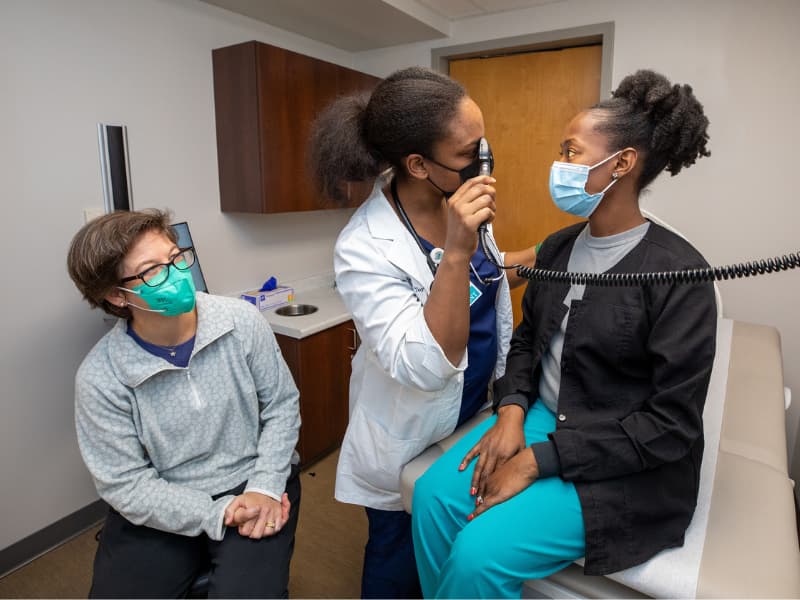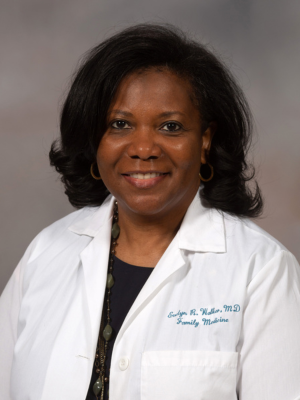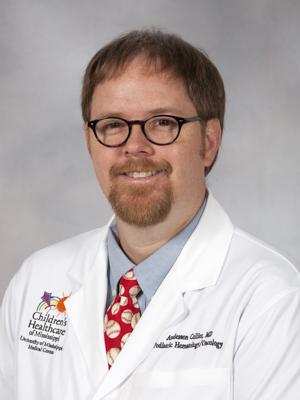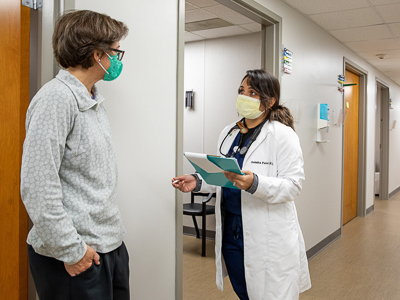For adults with sickle cell, new clinic relieves pain of neglect

One of the guarantees of sickle cell disease is pain – and not just in the body.
There’s physical pain caused by the hook-shaped cells digging into your vessels and blocking up your blood. And, as you grow older and find fewer physicians who will take you on, there’s the anguish of not knowing where to turn.
This was the pain of Kameisha Caswell, 31, who was able to see specialists as a child, she said, “but didn’t really know where to go next for care as an adult.”
Now she does – in her own town of Greenville, where a Medical Center physician, Dr. Melissa McNaull, is helping train family medicine residents to deliver expert care to a neglected patient population: adults with sickle cell disease.

“This is ground-breaking,” said Dr. Evelyn Walker, program director of the MS Delta Family Medicine Residency Program, housed in Delta Health-The Medical Center, where McNaull also sees patients like Caswell once a month in the Delta Health Family Medicine Clinic.
It’s also convenient, said Caswell, who happens to work at Delta Health as an RN and case manager.
“I know a lot of people who have to take off from work, if they can get work, to go to Jackson to see a doctor. Some have to find someone to drive them there.”
Now they don’t, because of the partnership between Walker’s clinic and UMMC, one made possible through an $85,000, one-year renewable pilot grant from UnitedHealthcare.
“Our family medicine residents are learning how to take care of sickle cell patients, not only hands-on, but also through Dr. McNaull’s lectures,” Walker said. “It’s only going to be good, and already is.”
Since November, McNaull, professor of pediatric hematology/oncology at UMMC, has made the two-hour trip from Jackson to Greenville on the second Tuesday of each month. The director of the Medical Center’s Sickle Cell Program, she brings specialized patient care and knowledge to this Delta city, in a region which, like many elsewhere in the country, falls short when it comes to caring for adults with SCD.

The goal is to see at least eight patients regularly per visit, and a total of about 30 to 40, “but there are hundreds in the Delta,” McNaull said.
“We have wanted a sickle cell clinic in the Delta for years; Greenville is ideal because it is ‘high enough’ up in the Delta to be useful for many families.”
UnitedHealthcare offered the means, while the way was the brainchild of McNaull and her colleagues: Walker; Dr. Lessa Phillips, former chair of family medicine at UMMC and now a faculty member with the MS Delta Family Medicine Program; and Dr. Anderson Collier III, professor of pediatrics, division director of pediatric hematology-oncology at UMMC.

“I’ve wanted to expand our sickle-cell services into this area for several years now,” Collier said.
It’s up to the family medicine doctors in the Delta to take this on for the future, McNaull said. “There is no hematologist there to send these patients to. The adult hematology world – and this is everywhere – is not taking care of sickle cell patients.
“In the Delta, there are some pediatricians who care for patients with sickle cell disease, but there have been no doctors for adults. At the new Greenville clinic, we see patients of all ages.”
In Jackson, McNaull also sees patients once a month at the Jackson Medical Mall, helping young adults with the disease move from pediatric to adult care.
At the Medical Center, children with sickle cell go to the Children's of Mississippi Center for Cancer and Blood Disorders, located in the basement of the Batson Tower. “We see 900-plus kids,” Collier said.
“Although we see cancer patients more often, we see vastly more sickle cell patients.” They come from many parts of the state, including the Delta.
“There is not a great place to send them for care when they become an adult, which is why we are excited about this partnership in Greenville,” Collier said.
“Bringing children into adult medicine is a problem across the country, and not just with sickle cell. They are cared for by pediatricians throughout childhood and at some point need to transition to adult care.
“Often, though, parents and children don’t like to move on and leave the nest of pediatrics, if you will. So, getting this clinic in Greenville was an opportunity dropped in our laps, thanks to the grant from UnitedHealthcare; and Dr. McNaull jumped on it.
“Her commitment to sickle cell patients in the state is really to be commended.”

McNaull is drawn to them, in part, because they are so “marginalized,” she said.
“They have a chronic disease where we could make such a big impact in a short period of time. It’s been neglected for so long. It’s an area where I thought I could make a difference in my lifetime.”
The life of those with a severe form of the disease is, on average, compared to the general U.S. population, 30 years shorter.
They are diagnosed practically at birth. Both parents must carry the SCD trait to pass it on to their children, and there is a one-in-four chance this will happen. While care starts at two months of age, symptoms don’t usually appear until age six to 12 months.
In the United States, most sickle-cell sufferers are Black or Latinx with African ancestry. They are less likely to have private health insurance or disposable income, reports the journal, Nature.
Because of SCD, an estimated 100,000 people in the U.S. are besieged by abnormal hemoglobin, a protein that delivers blood everywhere in the body. But, because of its C shape, it fails miserably, clumping and sticking, causing infections or organ damage.
The pain can be excruciating. Opioids work well against it, and for that reason, some patients encounter the pain of not being believed that they are in pain.
There are sustaining treatments for SCD, but the only cure for this inherited, lifelong disorder is stem cell or bone marrow transplants; because of their sizable risks, they don’t happen often.
As McNaull explained, the condition does have a merciful side, although it doesn’t do its beneficiaries any good unless they have malaria.
“The sickle cell trait evolved as a protection against it,” McNaull said. “That’s why so many people who have it are from, or trace ancestry to, places where malaria is common: India, parts of Central and South America, and Africa.
“What we see here is mostly ancestry from west Africa.”
The adult program at UMMC follows about 600 of these adults, McNaull said. “But there are about 2,000 adults in the state with sickle cell anemia who are not receiving sickle cell care; many receive no primary care at all.”
Mississippi’s sickle cell population is about 4,000. “Although Jackson has the largest number, the biggest concentration per capita is in the Delta,” McNaull said.
Among them is Caswell, the Delta Health case manager who had been driving to Jackson about every three months. Since November, she has been able to see McNaull and company close to her job.
“It’s less expensive for me,” Caswell said. “Because my insurance is not with UMMC, I had to pay out-of-pocket before. But I’m covered by insurance here.”
She had heard about clinic while at work, she said. “I kind of made my own referral.”
While transportation was not her problem, it was for Stephon Jackson, 26, a former Southaven resident who recently came back home to Greenville.
“I hadn’t really been seeing anyone since becoming an adult,” said Jackson, a phlebotomist and Uber driver.
“I was seeing a pediatric doctor, a sickle cell doctor, in Jackson before that, but he let me go when I turned 19.”
For adult care, he did make the trip for a while to Jackson from Greenville, where he was living at the time; but that stopped about five years ago when he made his home in Southaven, nearly three hours away.
“It was too far,” he said. “Now, I’m back in Greenville and I plan to go to the Greenville clinic every month.
“I know a lot of folks around here who have sickle cell, and I knew someone in Greenville who passed away last year; she was in her 20s.
“So, having this clinic is nice. I would love to be part of helping make it grow.”
It will serve many who have had no care or who had to drive for hours to Jackson or Memphis before now, often meaning a day of missed work. They may still have to drive to Jackson occasionally for care, but perhaps only once a year, McNaull said.
“Missing a whole day of work is a big deal for many in the Delta. If they don’t go to work, they don’t get paid.
“When your priority is putting food on the table or a roof over your head, it’s hard to focus on health care. It’s so hard for many to come to Jackson for their care, or for their child’s.”
But especially for their own, Collier said: “Adults don’t go to the doctor for themselves as much as they should. They are more likely to do so if they have to drive only 20 or 30 minutes, instead of two hours.
“So, the short-term goal of the Greenville clinic is to see patients in the Delta now. The long-term goal is to get well-trained providers in the area who can give specialized care to adults with sickle cell disease, and closer to home.”
To that end, McNaull delivers lectures on SCD to residents in the MS Delta Family Medicine Residency Program, who number 16. These sessions are provided for by the grant. Those residents, who also have the opportunity to visit patients with McNaull, include Dr. Anisha Patel of Jackson.
“I eventually want to open up a clinic and see all kinds of patients, including those with sickle cell,” Patel said. “Not a lot of doctors see these patients anywhere.”
Patel’s plan is good news for McNaull, especially if the young physician should decide to practice in places like the Delta.
“The family medicine residency program at Delta Health was set up for rural health care,” McNaull said, “and its goal is that these physicians will stay in a rural area.
“The resident a family sees is their doctor; they have a medical home there. And, if it’s sickle cell-related, the residents can call me when I’m not there. And they have.
“By the time they’re done with their residency, I want them to be able to take care of sickle cell patients, mostly on their own. That’s what sets this program apart; it’s the philosophy of ‘teach a man to fish,’ rather than catch a fish for him.”
Caswell, for one, is glad there’s a clinic around to catch her. “It’s phenomenal,” she said.


